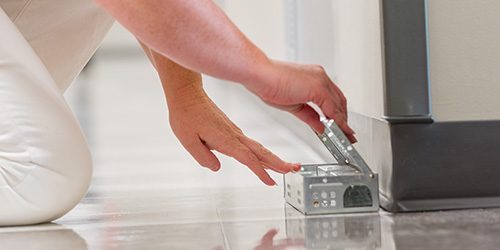5 Pest Management Tips to Prepare Your Facility for Summer
Insects and many other pests love the warm weather, coming out of their hibernation for a few months of feeding — and becoming a huge nuisance on food manufacturers. Food industry leaders can get a jump start on their pest management planning before the season changes by implementing some essential preventive measures to keep these critters from migrating into their food processing facilities.
5 Pest Management Tips for Summer Preparedness
1. Maintain your exterior landscape
Common pests like ground beetles, crickets, earwigs, springtails, millipedes, and centipedes will often harbor and breed in grassy, unkempt outdoor areas. Protect your facility from these invaders by maintaining your exterior lawn and landscaped areas, keeping vegetation away from the building, and eliminating excess moisture next to the building. It’s also common to find these bugs inside interior rodent traps flanking your dock or exit doors, so be sure to conduct pest management checks in those areas regularly to prevent nesting.
2. Employ exterior sanitation
Larger pests like rodents, birds, wildlife, and large flies will flock to odors and debris from improperly discarded food waste. Take the time to clean up spills around your receiving area, under the dumpster, and exterior break areas while discarding trash properly and keeping exterior containers closed. The practice will also eliminate any food availability and breeding sites for these pests around your facility.
3. Conduct pest prevention
The best pest management strategy requires consistent inspection of any possible entry points. Check around your dock door, windows, the screens and vents around the building, and any broken or missing screens or vents on the roof. These protective measures help prevent the entry of birds and flying insects like blow flies, house flies, Indian meal moths, and warehouse beetles during a pre-summer self-inspection. It’ll also help eliminate rodent entry points that are greater than 6 mm.
4. Inspect incoming shipments
A trailer or containers with beverages, fruits, or fermenting products can draw in pests like fruit flies with any spilled or damaged products. Since they only require eight to ten days to complete their life cycle at 85°F, containers can become infested quickly, requiring manufacturers to be more diligent and thorough when unloading or shipping in the summertime.
Any opening or hole in food containers will also attract and harbor flies, occasional invader pests, and rodents during transit. A rodent or pest stored in a product can easily hitchhike on the shipping vehicle if it stops somewhere during transit. Be on the lookout for signs of live pest activity during the unloading process to keep unwanted invaders from entering your facility.
5. Train staff on personal hygiene practices
Pest management is a company-wide practice, and poor cleanliness among staff can quickly draw the unwanted interest of all sorts of creatures. Pests like German cockroaches, insects, and stored product pests can enter a facility via personal belongings.
If these pests find a residence in the facility, they will multiply quickly to an infestation level in the summertime. Within three and a half to four months after its introduction, one gravid German cockroach can lead to 30 to 40 adult cockroaches in the facility. Be on the lookout for pest activity in break rooms, lockers, waste management areas, and receiving offices — all key areas where these intruders can enter your facility.
Prioritizing Pest Protection in Your Facilities
Regardless of the season, it’s never too late to start your facility’s pest management preparations to deal with summer nuisances. Conduct self-inspections, detail your findings, and start applying response plans and strategies if you discover issues with your current approach.
AIB International offers courses on integrated pest management among other auditing and inspection resources to improve your facility’s and staff’s response to these issues. Sign up today to ensure you’re prepared to handle risks to your operation.


